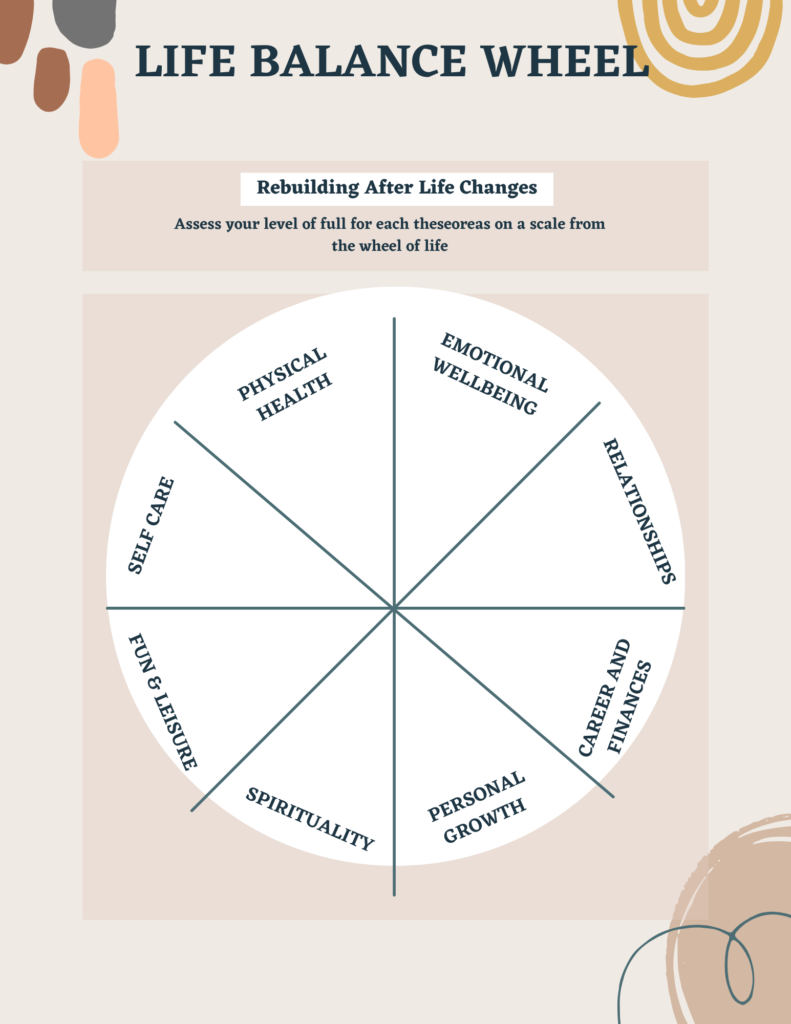The Life Balance Wheel (also known as the Wheel of Life) is a self-assessment tool used to evaluate and reflect on the balance between different areas of your life. It is often used in coaching, personal development, and goal-setting. The wheel is typically divided into segments representing key areas of life that are important to overall well-being and satisfaction.

Focus:
- processing emotional responses
- having self-compassion
- managing stress
Focus:
- maintaining existing relationships
- building new relationships
- setting healthy boundaries
Focus:
- exploring new career paths
- managing personal finances
- planning for your future
Focus:
- learning new skills
- exploring new interests
- embracing personal development
Focus:
- connecting with a sense of purpose
- finding meaning beyond oneself
- engaging in spiritual practices
Focus:
- making time for enjoyable activities
- letting go of stress
- fostering a sense of enjoyment
Focus:
- prioritizing self care practices
- preventing emotional burnout
- maintaining your positivity
Focus:
- maintaining your energy levels
- managing stress through exercise
- eating healthy & enough restful sleep
• You rate your satisfaction or fulfillment in each category on a scale (usually 1 to 10).
After rating each area, you connect the points to form a “wheel” shape.
• The goal is to assess the symmetry of the wheel; ideally, the areas should be balanced, indicating a well-rounded life.
• The Life Balance Wheel helps identify areas that may require more attention, so you can set actionable goals for improvement. It’s a great visual tool for prioritizing personal development, reflecting on your current state, and planning for a more balanced life.
• Coaches often use this tool with clients to open discussions about life satisfaction and help guide future steps in improving overall happiness and fulfillment.
The Life Balance Wheel serves as a practical and visual tool for individuals to assess and reflect upon the various aspects of their own personal life experience. Its purpose goes beyond mere self-assessment; it encourages being mindful of how different areas of your life, such as career, health, and relationships, are interconnected.
By assigning a score to each segment of the wheel, individuals can quickly identify areas where they feel fulfilled and areas that may need more focus, improvement, or commitment. Employing this tool highlights any imbalances in your life, giving a clearer picture of your life’s overall equilibrium. This awareness fosters intentional decision-making and goal-setting, empowering individuals just like you to make targeted improvements for personal growth and fulfillment.
Over time, revisiting the wheel allows people to track their progress and maintain a healthier, more balanced life, making it an effective tool for personal development and coaching.
1. Print out the wheel.
2. Individually rate yourself against each section on a scale of 1 (very imbalanced) to 10 (very balanced). Be honest about your current state in each area.
3. Color in or shade each area according to your rating, using a darker color or shade to indicate more balanced area and a lighter area to reflect greater imbalance.
4. Once you have a visual representation of your current life balance state, reflect on the focus prompts listed for each section.
5. Use this information to set goals, priorities, and create an action plan for improving yhour balance in each area.

If you have questions about the Life Balance Wheel (Wheel of Life) please feel free to reach out to Tamara through this website's Contact page.
While there are many approaches to the definition and study of the Life Balance Wheel, and even disagreement on the number of sections (7, 8, 10, etc.) it should be broken into, the principles are universal. If you would like to read more about the Wheel of Life, here is another resource: CLICK HERE.